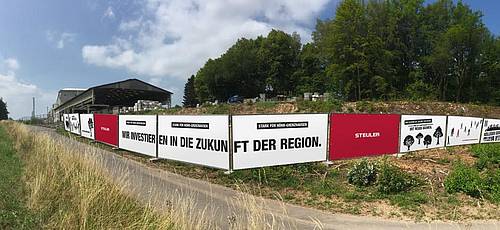The Steuler Group site in Höhr-Grenzhausen is currently a rendezvous for excavators and trucks.
In future, Steuler's Höhr-Grenzhausen and Breitscheid factories will have kiln capacities for manufacturing special refractory and acid-resistant bricks totalling 50,000 tonnes per year at their disposal. The infrastructure is also being upgraded to cope with the larger kiln capacity - the preparation areas, presses, warehouses and packing lines in Höhr-Grenzhausen have to be completely refurbished and brought up to date.
Because the 96-metre-long kiln and ancillary facilities operate with remarkable energy efficiency, the project is being subsidised by the KfW (Kreditanstalt für Wiederaufbau – who provide finance for regeneration). The new kiln will save around 340,000 euros each year on gas costs – with a simultaneous increase in performance. Thanks to its intelligent heat recovery system, waste heat from the kiln will be used for drying, heating the buildings and producing hot water.
Nevertheless, extensive construction works lie ahead before the new tunnel kiln can go into service. The new cascade absorber with chimney stack was part of the initial building phase and has now been in operation for several months. Work in the "preparation" area has already been completed too: The old milling units have been replaced by modern gyratory crushers that are fed by upstream jaw crushers for course-grinding. A newly installed dust extraction system ensures that working conditions are safe and protects the machinery.
The automatic dispenser will be replaced in the next six months, after which work pertaining to the preparation, weighing and mixing process stages will be complete.
Investment is also being made in the presses so that they can keep up with the increased kiln capacities. An automatic hydraulic press is currently being constructed. This is the fourth proprietary Steuler construction of its kind. An additional press for kiln furniture is being installed as well. As soon as both are in operation – expected in July of this year – work will continue with new hydraulic systems, control systems and guide columns for two existing presses. This means there will be a total of 14 powerful hydraulic presses available for moulding refractory and acid-resistant bricks in future.
Outdoors, meanwhile, groundworks alongside the railway lines are progressing nicely. The construction site is being tidied up, new drains laid, filled and compacted. A rainwater collection basin is also being built. The next stage will involve the construction of a hall on the new foundations, which is scheduled for completion by December 2019. The new kiln will be installed in this building immediately thereafter. After successful commissioning, the old tunnel kiln from 1951 will then be retired the following year. A new energy-efficient packing line will be installed in its place, and a new stretch-wrapping system will replace the existing shrink-wrapping unit. The increased kiln output requires more storage space. This is being provided in the shape of a 7,500 m² commissioning warehouse. Following completion of all the building works, it will be time to re-plant the grounds. A tree-lined avenue will be planted on the area it was necessary to clear in order to maintain the overall appearance of the landscape.


